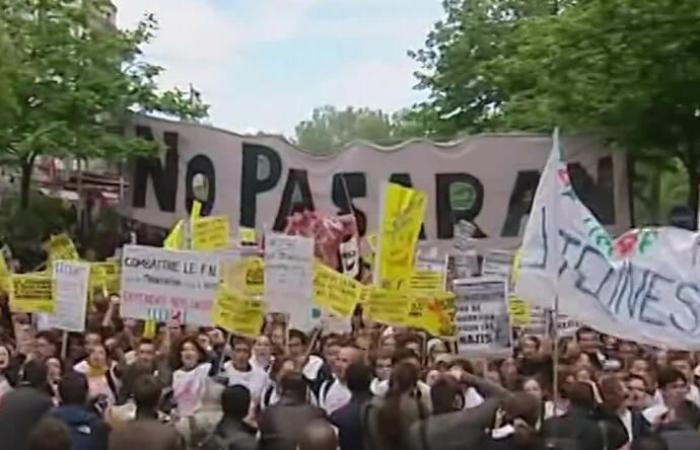THE NEWS.
On Monday, July 1, 2024, a collective of artists, including Akhenaton (IAM) and Fianso, were to release an unpublished piece entitled Not pass. Inspired by the famous anti-fascist slogan, this title aims to denounce the rise of the extreme right in France, in the aftermath of the first round of early legislative elections. A new anti-FN anthem, after Dirty stuff black Bérurier or Marine from Diam’s?
ARCHIVES.
« Not pass! “, or in French, “ They will not pass ! “. This anti-fascist slogan is one of the classic verbal elements of resistance movements. In 2002, as can be seen in the archive at the top of the article, it was widely used to oppose Jean-Marie Le Pen, the FN candidate who had reached the second round of the French presidential election. It could be chanted or affixed to banners.
Similar slogans had already been used against the German army during the First World War, notably during the Battle of Verdun. But it was at the outbreak of the Spanish Civil War that the Spanish-language version passed into posterity by becoming a slogan of the Republicans.
On July 19, 1936, in the face of Franco and his troops’ attempted coup against the young Second Spanish Republic, the communist deputy Dolores Ibarruri urged her comrades to resist. The speech she gave insisted on several occasions: ” The fascists shall not pass! They shall not pass! “. Or in French : ” The fascists will not pass! They will not pass! ».
The impact of a slogan
« Dolores Ibarruri’s words have an immense influence on Republicans “, explains historian Yannick Ripa in her article The myth of Dolores Ibarruri. « As soon as they are pronounced, they become a slogan, without being assimilated to the statement of the Communist Party line, a correct thought, an inescapable truth. “The words of the communist deputy remained in Spanish history, but also in French history.
When in 1977, after the fall of the Franco regime, Dolores Ibarruri stood for the first free elections, she made the front page of the Antenne 2 news. The excerpt available below bears witness to this. The communist, now an old lady, was also questioned about her return from exile.






